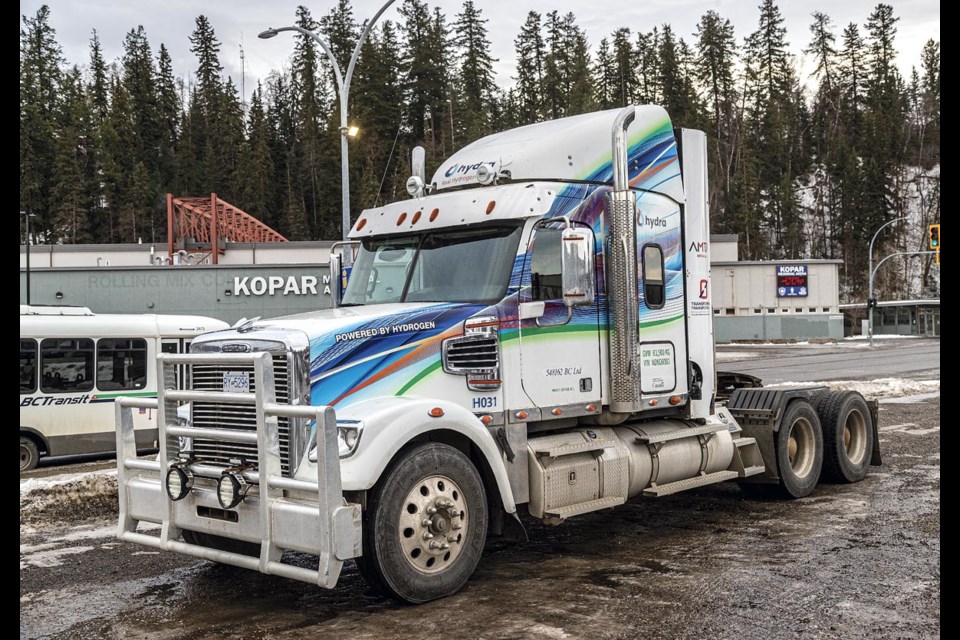The decarbonized future is upon us and with his clean-burning hydrogen solution, Badr Abduljawad is already in on the ground floor of a wave that’s coming to the transportation sector.
And it’s not fuel cells he’s advocating for the trucking industry; he’s all about internal combustion.
As chief innovation officer and co-founder of Hydra Energy, a Vancouver company that intends to make Prince George a hydrogen hub with its proposed manufacturing/filling station on Sintich Road, Abduljawad says more truckers will be sold on the benefits of adopting the hydrogen advantage when they no longer see thick black exhaust fumes spewing from their diesel engines.
“Our technology allows us almost to have hydrogen almost at the exact same price as diesel, so the incentive is really behind decarbonizing your fleet,” said Abduljawad, who spoke at the Future Fuels Forum that wrapped up Tuesday, Jan. 14 in Prince George.
“The customers and the customers they service have large (emission) reduction targets and being able to decarbonize with a technology like co-combustion takes the uncertainty behind the technology out of it.”
Truckers like the peace of mind having a full tank of diesel provides during their long hauls and Hydra’s dual-fuel system won’t infringe on that comfort. The conversion to dual-fuel allows hydrogen to enter the combustion chamber at the air intake and mixes with air going into the engine, but it’s the diesel that ignites the compressed cylinders.
“It’s a dual-fuel technology so the hydrogen cannot combust without diesel, and if you run out of hydrogen or there’s an issue with the hydrogen system the vehicle will continue running on diesel,” said Abduljawad.
“So for both the fleet and the customer the goods are always being delivered and the hydrogen is just used to decarbonize that delivery. Until that infrastructure and security is built it’s a perfect transition.”
Hydrogen is made by electrolysis, a process planned for the Prince George station that splits water molecules into the basic elements using electricity. The cost of making that hydrogen, which is about the same as diesel, has impacted the Hydra business model and the Prince George filling station, initially expected to be finished in 2024, won’t open until the fall of 2026.
“We can’t manufacture it below a certain price, whereas diesel and conventional fossil fuels due to the large economies of scale gets to be a lot cheaper than the other ones and that’s a big limitation for us,” said Abduljawad.
”We can only be at diesel parity to a certain point and then we can’t go below that. I speak for all of the hydrogen developers out there trying to build the infrastructure because it’s got to make sense.”
Paul Vendittelli, director of economic development and transportation for the City of Prince Rupert, said there has to be more government investment in alternate fuel advancements and infrastructure to ensure large gaps along transportation corridors no longer exist.
“The main barrier is going to be power and de-risking this industry from private sector and that’s going to need assistance from the government to do that,” said Vendettelli. “There’s not a lot of trucking companies that are going to take the risk on (alternate fuel) trucks without some help.”
It costs about $60,000 and three or four days in a repair shop to convert a transport truck to a dual hydrogen-diesel system. Burning just hydrogen alone gives drivers a range of 1,000 kilometres before they need to switch on the diesel, resulting in a 40 per cent reduction in emissions between fill-ups.
Barar said dual-fuel hydrogen-diesel systems make more sense for large tracks due to the prohibitive cost of refuelling a large fuel cell.
In March 2023, Hydra announced it has signed memorandum of understanding agreements with eight local trucking firms to convert Type 8 trucks to Hydra’s hydrogen-diesel system at the Velocity Truck Centres in the BCR Industrial Site. Velocity does the conversions and has a service bay dedicated to hydrogen/natural gas system repairs on vehicles with dual fuel and hydrogen fuel cell systems.
Abduljawad said there are eight trucks already converted and by the end of the year another 20-30 trucks will be running on hydrogen. A Hydra truck is currently on display at the Civic Centre for the BC Natural Resources Forum.
“We’ve had many single-truck trials and we’ve had conversations about converting more trucks but no one has said I’ll convert 50 trucks right away, it’s always a couple stepping stones first,” Abduljawad. “They’re all receptive to it, it’s just that the infrastructure is always the challenge.
“Having more municipalities or more provincial government commit some of their own vehicles and give a larger incentive to get those vehicles converted would build that infrastructure because economies of scale play a big role in reducing that price.”
Hydra has been in business since 2012 and currently serves commercial fleets in Prince George and Edmonton. The company is scaling up its operation in Prince Rupert and it envisions eventual expansion throughout Western Canada. Most of its efforts to create a hydrogen hub for the region have centred around Prince George.
“We’ve spent a lot of time in Prince George and we’re a strong believer in the city because it’s a big trucking hub,” said Abduljawad. “No matter what it was we’ve always targeted Prince George initially. There’s access to a lot of land and a lot vehicles are interested in doing it.
“Prince George is central to everything. It’s hallway to Edmonton, halfway to the port (Prince Rupert) and it’s the same distance to Vancouver. “It’s a very important space to have hydrogen.”

.png;w=120;h=80;mode=crop)

